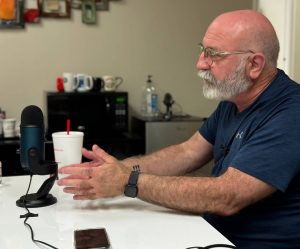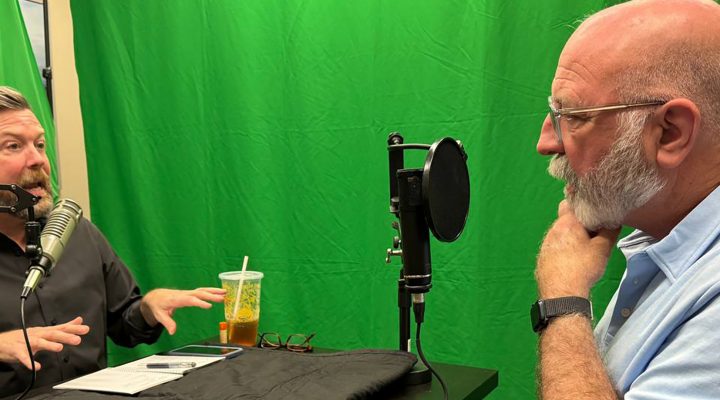Baptist News Global Executive Director Mark Wingfield and blogger Benjamin Cole don’t see eye-to-eye on everything in Baptist life, but they do agree their respective denominations have drifted further apart than ever before.
In the inaugural episode of the “Stuck in the Middle with You” podcast, the two hosts compared the Cooperative Baptist Fellowship and the Southern Baptist Convention as trains following increasingly divergent tracks.
“Over time, I think the SBC track continues to veer to the right, and the CBF track goes down and veers a little more to the left. That’s been very painful too. So, the gap between SBC and CBF today — politically, theologically — is greater than it was 30 years ago,” said Wingfield, who was raised Southern Baptist but attends a CBF-affiliated church in Dallas.

Benjamin Cole
Cole, a committed Southern Baptist also known as The Baptist Blogger, pointed to a moment in the mid-1980s when Adrian Rogers, an architect of the conservative takeover of the SBC, and Cecil Sherman, who would become CBF’s first coordinator, served together on a committee seeking to bring peace to divided Southern Baptists.
“There’s no way that happens anymore,” Cole said. “My larger point is there was a wider community of Baptists and when CBF formed, Southern Baptists lost something, too.”
And there are some in CBF who lost something, too, Wingfield added. “Not everyone who left to go with CBF would embrace where CBF is now.”
Wingfield and Cole have set out to prove in their new podcast that Baptists who disagree on many theological and political points can find commonality without compromising deeply held beliefs.
“The core identifiers or markers of our respective identities … allow us to talk some of the same language, having traveled some of the same past.”
“I’m still not going to be a member of your church, and you’re not going to be a member of my church, and our expressions of church community and church life are very, very different,” said Cole, whose blog is known for often being critical of SBC officials and policies. “And yet there is this sense of what are the core identifiers or markers of our respective identities that allow us to talk some of the same language, having traveled some of the same past.”
Those identifiers include both being raised in the SBC, attending SBC seminaries, pursuing careers in Baptist news and a desire not to let denominational difference stifle dialogue.
“Part of the reason this works is that we both come out of a deep Southern Baptist background,” Wingfield said. “I was born in December of 1961 into a Southern Baptist family, went to a Southern Baptist church my entire life until our church left the Southern Baptist Convention in the year 2000. For the first 40 years of my life, not only did I attend a Southern Baptist church, I worked in Southern Baptist entities along the way.”

Mark Wingfield
Those entities included the Home Mission Board, Southwestern seminary and Baptist newspapers in New Mexico, Kentucky and Texas. Wingfield and his church left the SBC in 2000, and as associate pastor there for nearly 17 years he was deeply involved in CBF.
After graduating from Southeastern Baptist Theological Seminary, Cole became a writer for Southwestern Seminary’s news department. But he was booted by then-president Paige Patterson, whom he had previously angered with his blogging. “My strike was saying that Lifeway was selling crap in the campus bookstore,” he quipped.
A shared desire to hold religious leaders accountable is another goal Wingfield said he shares with Cole, who is an occasional contributor to BNG: “Ben and I have been friends for several years, which some of you listening would say, that’s probably an unlikely friendship. But this is the way the world works.”
The hosts agreed that what happened to Rick Warren, the retired pastor of Saddleback Church in California, epitomizes the rightward shift in the SBC.
“We’re now in conservative resurgence 3.0, not 1.0. The SBC is so different today than it was even in 2000. It’s a totally different place,” Wingfield said.
So different that Saddleback was expelled from the SBC in 2023 for ordaining women as pastors and allowing women to preach during worship. This despite the fact Warren and Saddleback exemplified the focus on evangelism the SBC claimed as crucial to its identity.
“The SBC is so different today than it was even in 2000. It’s a totally different place.”
“Rick is one of those people who came out of the conservatism I call warm evangelicalism,” Wingfield said. “Rick is someone who to this day is motivated by true evangelism, not evangelicalism as much. These things matter to him — bringing people into relationship now.”
Evangelism was just a beginning for Warren, author of The Purpose Driven Life, Cole added. “It was about making disciples. It’s not just getting them in the door, but getting them plugged in to serve. And Saddleback did that, and he wrote the blueprint for it. I think his model changed everything. And he’s not gotten the credit quite the way he deserves because now the latest iteration is we have to separate ourselves and distance ourselves from Rick Warren in the Southern Baptist Convention.”
Another irony in the Warren situation is that Al Mohler, president of Southern Baptist Theological Seminary and one of the leading far-right voices in the SBC, used to take his staff to Saddleback for retreats, Cole said. “We’re talking like within the last several years this has happened and now it’s just forbidden to do that.”
Mohler also epitomizes the rightward shift of the SBC, Cole added. “There has been no person who has been lurching to the right more than Mohler. … The only way to continue to be Southern Baptists is to move rightward with Al.”
Future episodes of the podcast, which drops on Thursdays, will address topics such as the SBC’s broken trustee system, the role of missions in uniting Baptists and the ongoing evolution of theological education.
The goal is to “bring truth to light in a way that will help whether we’re Southern Baptist or CBF,” Cole said. “It will help believers from the Baptist tradition reflect more faithfully and fairly upon the river we both come from.”


